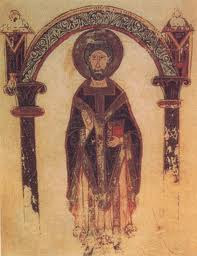Life of St. Hilary Bishop of
Poitiers
Doctor of the Church.
 |
| St. Hilary, Early Christian Painting |
St. Hilary was sometimes referred to as the "Hammer of the Arians" (Latin:
Malleus Arianorum) and the "Athanasius of the West." His name comes from the Latin word for happy
or cheerful. His optional memorial in
the Roman Catholic calendar of saints is 13 January. In the
past, when this date was occupied by the Octave Day of the Epiphany, his feast
day was moved to 14 January.[2]
Bishop,
born in Poitiers at the beginning of the fourth century; died there 1 November,
according to the most accredited opinion, or according to the Roman Breviary,
on 13 January, 368. Belonging to a
noble and very probably pagan family, he was instructed in all the branches of
profane learning, but, having also taken up the study of Holy Scripture and
finding there the truth which he sought so ardently, he renounced idolatry and
was baptized. Thenceforth his wide
learning and his zeal for the Faith attracted such attention that he was chosen
about 350 to govern the body of the faithful which the city had possessed since
the third century. “So great was the
respect in which he was held by the citizens of Poitiers that about 353,
although still a married man, he was unanimously elected bishop.”
We
know nothing of the bishops who governed this society in the beginning. Hilary
is the first concerning whom we have authentic information, and this is due to
the important part he played in opposing heresy. The Church was then greatly
disturbed by internal discords, the authority of the popes not being so
powerful in practice as either to prevent or to stop them. Arianism had made
frightful ravages in various regions and threatened to invade Gaul, where it
already had numerous partisans more or less secretly affiliated with it.
Saturninus, Bishop of Arles, the most active of the latter, being exposed by
Hilary, convened and presided over a council at Béziers in 356 with the
intention of justifying himself, or rather of establishing his false doctrine.
Here the Bishop of Poitiers courageously presented himself to defend orthodoxy,
but the council, composed for the most part of Arians, refused to hear him, and
being shortly afterwards denounced to the Emperor Constantius, the protector of
Arianism, he was at his command transported to the distant coasts of Phrygia.
But
persecution could not subdue the valiant champion. Instead of remaining
inactive during his exile he gave himself up to study, completed certain of his
works which he had begun, and wrote his treatise on the synods. In this work he
analysed the professions of faith uttered by the Oriental bishops in the
Councils of Ancyra, Antioch, and Sirmium, and while condemning them, since they
were in substance Arian, he sought to show that sometimes the difference between
the doctrines of certain heretics and orthodox beliefs was rather in the words
than in the ideas, which led to his counselling the bishops of the West to be
reserved in their condemnation. He was sharply reproached for his indulgence by
certain ardent Catholics, the leader of whom was Lucifer, Bishop of Cagliari.
However, in 359, the city of Seleucia witnessed the assembly in synod of a
large number of Oriental bishops, nearly all of whom were either Anomoeans or
Semi-Arians. Hilary, whom everyone wished to see and hear, so great was his
reputation for learning and virtue, was invited to be present at this assembly.
The governor of the province even furnished him with post horses for the
journey. In presence of the Greek fathers he set forth the doctrines of the
Gallic bishops, and easily proved that, contrary to the opinion current in the
East, these latter were not Sabellians. Then he took part in the violent
discussions which took place between the Semi-Arians, who inclined toward
reconciliation with the Catholics, and the Anomoeans, who formed as it were the
extreme left of Arianism….
…He
then returned to his city of Poitiers, from which he was not again to absent
himself and where he was to die. This learned and energetic bishop had fought
against error with the pen as well as in words. The best edition of his
numerous and remarkable writings is that published by Dom Constant under the
title: "Sancti Hilarii, Pictavorum episcopi opera, ad manuscriptos codices
gallicanos, romanos, belgicos, necnon ad veteres editiones castigata"
(Paris, 1693).
The
later years of his life were spent in comparative quiet, devoted in part to the
preparation of his expositions of the Psalms (Tractatus super Psalmos), for
which he was largely indebted to Origen; of his Commentarius in Evangelium
Matthaei, an allegorical exegesis of the first Gospel; and of his no longer
extant translation of Origen's commentary on Job.
While
he thus closely followed the two great Alexandrians, Origen and Athanasius, in
exegesis and Christology respectively, his work shows many traces of vigorous
independent thought.
Towards the end of his episcopate and with his
encouragement Martin, the future bishop of Tours, founded a monastery at Ligugé
in his diocese.
He
died in 368; no more exact date is trustworthy
The
Latin Church celebrates his feast on 14 January, and Pius IX raised him to the
rank of Doctor of the Universal Church.
The
Church of Puy glories in the supposed possession of his relics, but according
to one tradition his body was borne to the church of St-Denys near Paris, while
according to another it was taken from the church of St-Hilaire at Poitiers and
burned by the Protestants in 1572.
Catholic Encyclopedia -- http://www.newadvent.org/cathen/07349b.htm
And Wikipedia-- http://en.wikipedia.org/wiki/Hilary_of_Poitiersnd
No comments:
Post a Comment